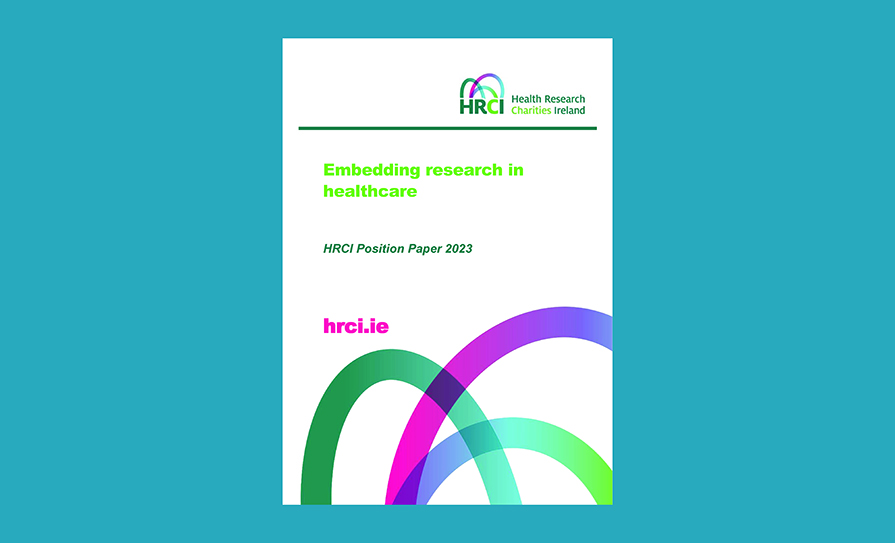Paul Mulholland examines a new paper from Health Research Charities Ireland and speaks to its CEO about removing barriers to research in Irish healthcare
Health Research Charities Ireland (HRCI) is a national umbrella organisation representing over 40 charities active in health, medical, and social care research. In January 2023, the HRCI published a position paper entitled Embedding research in healthcare.
The recommendations in the paper are based largely on the views of the HRCI board and members, which were captured through a survey in December 2022. They are also informed by recent Irish Health Research Forum events, which are run by the HRCI, guidance from the Forum’s steering group, as well as ongoing engagement and collaboration with stakeholders.
Speaking to the Medical Independent (MI), HRCI CEO Dr Avril Kennan (PhD) said all of the organisation’s members are heavily invested in health research.

“They are very, very familiar with the Irish system, but also what the barriers to research are,” according to Dr Kennan.
The position paper contains three recommendations, namely, implementation of a national electronic health record (EHR), which should be progressed urgently; the need to build on momentum in genetic and genomic research; and the establishment of research support functions within the health service.
EHR
The implementation of a national EHR was the “top priority” for the HRCI’s member charities in the December survey, according to the position paper.
It has also emerged as a recommendation from four separate Irish Health Research Forum events. The most recent of these was the meeting on embedding research in the health service held in May 2022.
According to the HRCI, a national EHR would support safer and more timely patient care and facilitate the use of valuable data to improve services and to support research.
Dr Kennan said the lack of this key piece of IT infrastructure is a subject of “huge frustration” for the organisation’s members.
She represented the HRCI at a meeting of the joint Oireachtas health committee on 25 January, which largely focused on the issue.
Earlier at the meeting, the HSE Chief Information Officer, Mr Fran Thompson, had explained how the HSE submitted a business case for a national EHR to the Department of Public Expenditure and Reform (DPER) and the Department of Health, as part of the 2015 e-health strategy. However, DPER rejected the submission in 2018.
Mr Thompson said DPER “wanted to see the outcomes and benefits from the investments” made in the New Children’s Hospital prior to making such a national investment.
Dr Kennan told MI she “completely understands” the difficulties the Irish health system has faced in improving its IT infrastructure.
“This is a mammoth task,” she said. “It needs considerable funding. It also needs considerable will, political will, but also will across the entire health system. So the challenges are big.”
However, she noted that it has transpired that DPER’s rejection of the EHR was not only due to funding, but also doubts about the overall capacity to deliver the project and how it would be implemented.
“What is less understandable is how this could have been turned down five years ago, and not revisited in a different format,” Dr Kennan said.
“It is clear eHealth Ireland are progressing in various ways. They have little pockets of progression across the system. But why it wasn’t revisited more holistically, and why nobody it seems looked at that again over the last five years, is really hard to understand.”
Genetics and genomics
The HRCI recognises progress made in regard to genetics and genomics, but calls for this progress to be sustained. The National Strategy for Accelerating Genetic and Genomic Medicine in Ireland was published in December 2022.
A financial commitment of €2.7 million to implement the strategy was also announced on the document’s launch.
Separately, European Commission and Health Research Board (HRB) funding for a genomic data infrastructure project was announced in November 2022. This was a key element in facilitating Ireland to sign up to ‘1+ Million Genomes’ initiative, which is a network across 20 EU member states to securely share genomic data.
Together, the position paper states these developments place Ireland in a strong position to support the start of what could become an Irish genome project. To enable this, the HRCI argues the National Office, which will be established as part of the new genetics and genomics strategy, will need to be resourced long-term. This is vital to both embed research in genetics and genomics healthcare and to support meaningful patient-public involvement (PPI) in its planning and governance, according to the organisation.
Dr Kennan said it was important that research is seen as a fundamental component in the implementation of the new genetics and genomics strategy.
“Everybody, naturally, thinks more about the healthcare elements because that has been such a major issue in Ireland,” she told this newspaper.
“We have had these huge waiting lists for genetic consultants, genetic counsellors; people have been left without really important answers for far too long.
“But we also want it that research is supported from the start as well. We think there is a real appeal in establishing an Irish genome project, and actually starting to look at the Irish population as a whole. This would answer really important questions about the types of genetic disease we have here, and look to, possibly through partnering with industry in a way that protects patient data, future treatments, and therapies.”
Research support functions
At the May 2022 Irish Health Research Forum event, the need to develop a culture where research is valued and integrated within the health service was recognised. Attendees recommended a move towards more clinical staff becoming active in research through the HSE National Framework for Governance, Management, and Support of Health Research. The position paper states the framework, which was published in September 2021, offers practical and sensible steps towards promoting and supporting clinical research. However, it argues “key pillars” of the plan have not been resourced, including plans for regional research support functions. These will be essential to enable additional clinical staff to become involved in research and to ensure good governance. Research support is also necessary to facilitate links with universities, industry, health research charities, and PPI contributors.
Dr Kennan said the framework developed by the HSE is positive, but more focus is required on implementation. Speaking about the importance of recruiting and retaining staff, she highlighted how Irish healthcare professionals working abroad have seen the benefits that research can bring.
“But we haven’t enabled it here,” according to Dr Kennan. “In particular, we haven’t given healthcare professionals protected time to do research from within their roles.”
She referred to the hope the new consultant contract will provide a stronger basis for research than traditionally has been the case. And as set out in the paper’s recommendation, the provision of administration support is key.
“If you think about how it works in universities, they all have a very active research office that supports the researchers in applying for grants, in managing the funding to get the grants, in advising them on all aspects of that,” Dr Kennan said.
“They also have strong ethics committees. So there is a structure there that supports the researchers. But we haven’t had that in the health service.”
“In particular, we haven’t given healthcare professionals protected time to do research
from within their roles“
Clinical trials
The Programme for Government commits to promoting healthcare research and in particular clinical trials. A Review of clinical research infrastructure in Ireland, which was published by the HRB in 2019, found that there is significantly less clinical trial activity in Ireland compared to European countries such as Denmark, Norway, and Finland.
Dr Kennan admitted it is “a complex problem”, but comes down to a lack of support for research within the healthcare system. “We tend to lurch from crisis to crisis,” she said.
“Research can be seen as a luxury add-on, which it should absolutely not be. It should be embedded in the system. We know from many different international studies that patients do better when research is embedded in the system.”













Leave a Reply
You must be logged in to post a comment.